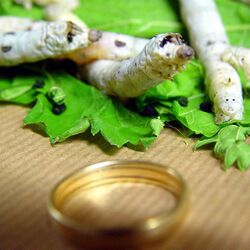Biology:Bombycidae
| Bombycidae | |
|---|---|

| |
| Caterpillars of the domestic silk moth (Bombyx mori), age 30 days | |
| Scientific classification | |
| Domain: | Eukaryota |
| Kingdom: | Animalia |
| Phylum: | Arthropoda |
| Class: | Insecta |
| Order: | Lepidoptera |
| Superfamily: | Bombycoidea |
| Family: | Bombycidae Leach in Samouelle, 1819[1][2] |
| Genera | |
|
See text | |
| Synonyms | |
| |
The Bombycidae are a family of moths known as silkworm moths. The best-known species is Bombyx mori (Linnaeus), or domestic silk moth, native to northern China and domesticated for millennia. Another well-known species is Bombyx mandarina, also native to Asia.
Taxonomy
The family was recently severely restricted, and currently contains only one or two subfamilies, the Bombycinae and Epiinae (previously the tribe Epiini). The former subfamilies Oberthueriinae and Prismostictinae have been placed as subjective junior synonyms of Endromidae. The former subfamilies Apatelodinae and Phiditiinae have been reinstated as separate families.[4][5]
Genera
This list is provisional. Epia may also be placed within Apatelodidae, along with Tamphana. Some genera were formerly placed in Apatelodinae, such as Anticla and Quentalia.[6]
- Amusaron
- Anticla Walker, 1855
- Bivincula
- Bivinculata
- Bombyx
- Colla
- Dalailama
- Elachyophtalma
- Epia
- Ernolatia
- Gastridiota
- Gnathocinara
- Gunda
- Moeschleria
- Ocinara
- Penicillifera
- Quentalia Schaus, 1929
- Racinoa
- Rondotia
- Tamphana
- Trilocha
- Triuncina
- Valvaribifidum
- Vinculinula
- Vingerhoedtia
References
- ↑ Samouelle, G. (1819). "Lepidoptera". The Entomologist's Useful Compendium. London: Thomas Boys. pp. 234–256. https://www.biodiversitylibrary.org/item/28896#page/251/mode/1up.
- ↑ Agassiz, L. (1846). Nomenclatoris Zoologici Index Universalis, continens nomina systematica classium, ordinum, familiarum et generum animalium omnium, tam viventium quam fossilium, secundum ordinem alphabeticum unicum disposita, adjectis homonymiis plantarum, nec non variis adnotationibus et emendationibus. Soloduri: Jent et Gassmann. https://books.google.com/books?id=tL71aMeiZHEC&pg=PA49.
- ↑ Latreille, P. A. (1809). Genera Crustaceorum et Insectorum. 4. Parisiis: Amand Kœnig. https://www.biodiversitylibrary.org/item/132543#page/198/mode/1up.
- ↑ Zwick, Andreas; Regier, Jerome C.; Mitter, Charles; Cummings, Michael P. (2010-09-30). "Increased gene sampling yields robust support for higher-level clades within Bombycoidea (Lepidoptera)". Systematic Entomology 36: 31–43. doi:10.1111/j.1365-3113.2010.00543.x.
- ↑ Kitching I, Rougerie R, Zwick A, Hamilton C, St Laurent R, Naumann S, Ballesteros Mejia L, Kawahara A (2018) A global checklist of the Bombycoidea (Insecta: Lepidoptera). Biodiversity Data Journal 6: e22236. https://doi.org/10.3897/BDJ.6.e22236
- ↑ Hamilton, C.A., St Laurent, R.A., Dexter, K. et al. Phylogenomics resolves major relationships and reveals significant diversification rate shifts in the evolution of silk moths and relatives. BMC Evol Biol 19, 182 (2019). https://doi.org/10.1186/s12862-019-1505-1
- Natural History Museum Lepidoptera genus database
- List of Bombycidae Types (Museum Witt München).
Wikidata ☰ Q30576 entry
 |

